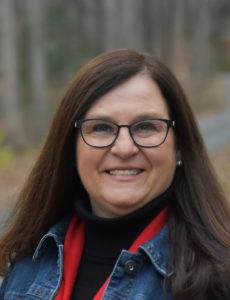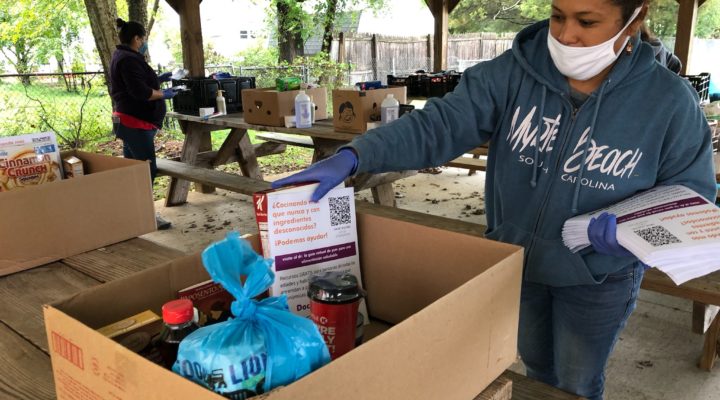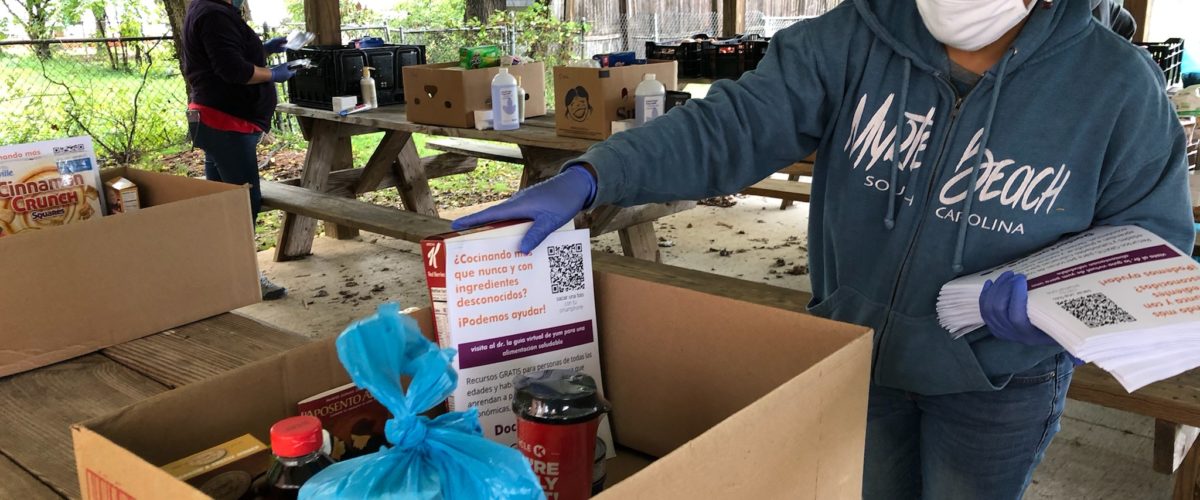Donald Trump’s four-year war on immigrants, refugees and asylum seekers has taken a heavy emotional and financial toll on those populations that will possibly take years to heal, CBF field personnel Sue Smith said.

Sue Smith
“The people I work with are just so exhausted they just shrug their shoulders and hunker down.”
Smith and her husband, Greg, run LUCHA Ministries, a Fredericksburg, Va., organization established to help foreigners find refuge in the United States. Most of their local clients are Latino.
But the rejection and shaming felt by those seeking shelter in the United States has extended to those who minister to migrants, she said. “It’s so hard to keep working with people who are continually beaten down.”
The limitations imposed by the COVID-19 pandemic also have been difficult for her and LUCHA clients. “It’s been hard for me to be in the office all the time. I usually avoid the office. It’s been depressing not to be able to go and interact with people.”
But there is light at the end of the tunnel for both immigrants and those who serve them, Smith said. She sees Joe Biden’s election to the presidency as a positive sign for immigrants and those who work with them.
“I hope that means things will get better for our clients,” she said. “At least I can’t imagine it being much worse than it’s been.”
Smith said it’s also helped her outlook to be accepted recently into the Rotary Peace Fellowship, a global program designed to train leaders to develop systems promoting peace.
Smith spoke with Baptist News Global about the fellowship, the challenges Latinos have faced during Trump’s presidency and at the hands of the coronavirus.
Has there been a sense of relief in your clients over the outcome of the election?
I haven’t talked to a lot of my clients about it yet because I am unable to get out very much. But there seems to be a feeling in general that things will get better. I think most of my clients are more driven right now by COVID concerns. The election has taken a back seat. They are aware of it but it’s not first and foremost in their minds. I hear a different message from the border. I hear there is much anticipation among those who are stuck at the border. I sit in a peer learning group with border pastors who say they are exhausted with the situation there.
How do you assess the damage done to immigrants by the Trump presidency?
It’s been exhausting because it feels like there is so little we can do or say to combat the miscommunication and outright lies people are saying about immigrants. It is going to take a long time to overcome all of that. It has desensitized people. It’s planting the idea for four years that migrants, immigrants, refugees and asylum seekers are bad people, and that we don’t want them. We become almost numb to that message. We don’t realize how deeply that is ingrained in our communities. I think it does deep damage to our communities and to our witness as Christians.
“It is puzzling to me how you can be both essential and expendable at the same time.”
Do your clients’ COVID-19 concerns center largely around their status as essential workers?
For many of them, yes. Some are documented, some are undocumented and a lot of these folks are labeled as essential workers. But the truth is they are essential but also expendable. If they get sick, they lose their jobs. So, they really don’t want to know if they are sick. They are afraid to be sick. It is puzzling to me how you can be both essential and expendable at the same time. Then there are others who work in construction, in restaurants or in hospitality cleaning hotel rooms. Or they have their small businesses cleaning homes. Most of that work has just dropped off for many of them.
The administration has increased the difficulty of the U.S. citizenship test. Do you see that as the biggest obstacle facing some of your clients now?
That’s the big one I see, athough DACA (Deferred Action for Childhood Arrivals) is also coming into play. These individuals, known as Dreamers, are still in limbo. But a court ruled Monday they had to reopen DACA. So as of Monday, they are accepting new applications again. They have to meet the original qualifications, but I know Greg was reaching out to make appointments as soon as possible. Good things rarely happened under the Trump administration, so there is a sense of urgency anytime something good comes along. We have to jump in and help our folks.
LUCHA has been in the news frequently and you have become known as a local expert on immigration. How did that come about?
It wasn’t just about immigration. We have become a go-to source for anything related to the Latino community here. There have been several newspaper articles about the Latino community in recent months, mainly with regard to COVID. The interest in LUCHA jumped after it became known that at least half of local COVID cases were Latino. Since then, journalists have become very interested in telling those stories. We have helped them with that. I have a of couple reporters I speak to quite often now.
Has that been helpful to the ministry?
For the ministry, that attention has generated contacts with churches and organizations that have become interested in helping us. We have had individual donations from folks, and the Community Foundation gave us money for operating funds which, in turn, enabled us to waive all the fees for our immigration services. And we just got money as well to continue that into 2021. I just wrote a blog article about that.
How does LUCHA get anything done with you and Greg working from home?
Take our Five Loaves ministry as an example. That’s our food ministry. Our food pantry is operated primarily by volunteers. We operate it as a pop-up food pantry outdoors, so it was pretty safe. We don’t have a physical pantry. It lives in the van. We deliver right from the food bank. All of us are involved in home deliveries. We drop off meals at people’s doors and call them from the sidewalk. If someone calls and says they are sick, we make sure they get acetaminophen, masks, gloves and sanitizers so they can quarantine. And we set them up with snacks and food they can microwave so they can eat without coming into contact with family. We also do fresh vegetable deliveries, and for that I do all the ordering from home. We got a grant from an Episcopal church here in town. Starting in the spring, we had farm-fresh fruits and vegetables and they ended up on my porch. The volunteers would come and get them.
I also have done counseling on my front porch. It’s been very interesting mental health-wise to hear people’s reactions to doing therapy on the porch. Many have said they like it because it feels less formal.
“I am kind of like a mom to a lot of these ladies. I just listen.”
How does it affect you when you can’t visit someone in need?
Over the weekend a pregnant asylum seeker called to tell me she had COVID. She asked me, “What can I take? Where can I go?” She doesn’t have a physician. She just goes to the health department. She’s very scared. She keeps asking me questions. “Who’s going to walk me through this? Can you pray for me? Can you pray for my baby? How much longer am going to have a fever?” A lot of it these days is talking it through and sharing experiences. I am kind of like a mom to a lot of these ladies. I just listen. A lot of people just feel cut off, and it’s worse because of the language barrier.
How did the Rotary Peace Fellowship come about for you?
It started a year and a half ago when I heard about it from a church member. Rotary meets at our church, so I know who they are and what they do. The program is for those interested in getting master’s-level certificate with opportunities for study abroad. On a whim I applied. The certificate aspect of it is for people working in community development, reconciliation and things along those lines. There were 750 applicants, and 120 chosen from around the world. Before I knew it, I was selected. We were supposed to travel over the summer but that got canceled due to the pandemic.
You are scheduled to travel to Thailand in February. Do you think that’s going to happen?
As of this week — Monday — it has gone virtual. The primary concern was about everyone being able to get VISAs. They were also concerned about people getting stranded in Thailand or becoming sick in transit. These are also the kinds of things we are talking about in CBF life when it comes to travel for field personnel.
Do you know what your fellowship project will be about?
I’m leaving that open. Initially, I thought it would be something local, a mental health project. But they are looking at big stuff and thinking outside the box. They want us thinking about something we would never have dreamed of doing. The program will put us in contact with high-level facilitators. We are talking about top U.N. officials who are going to be interacting with us. I have heard we will be making a virtual field trip into refugee camps in Myanmar.


